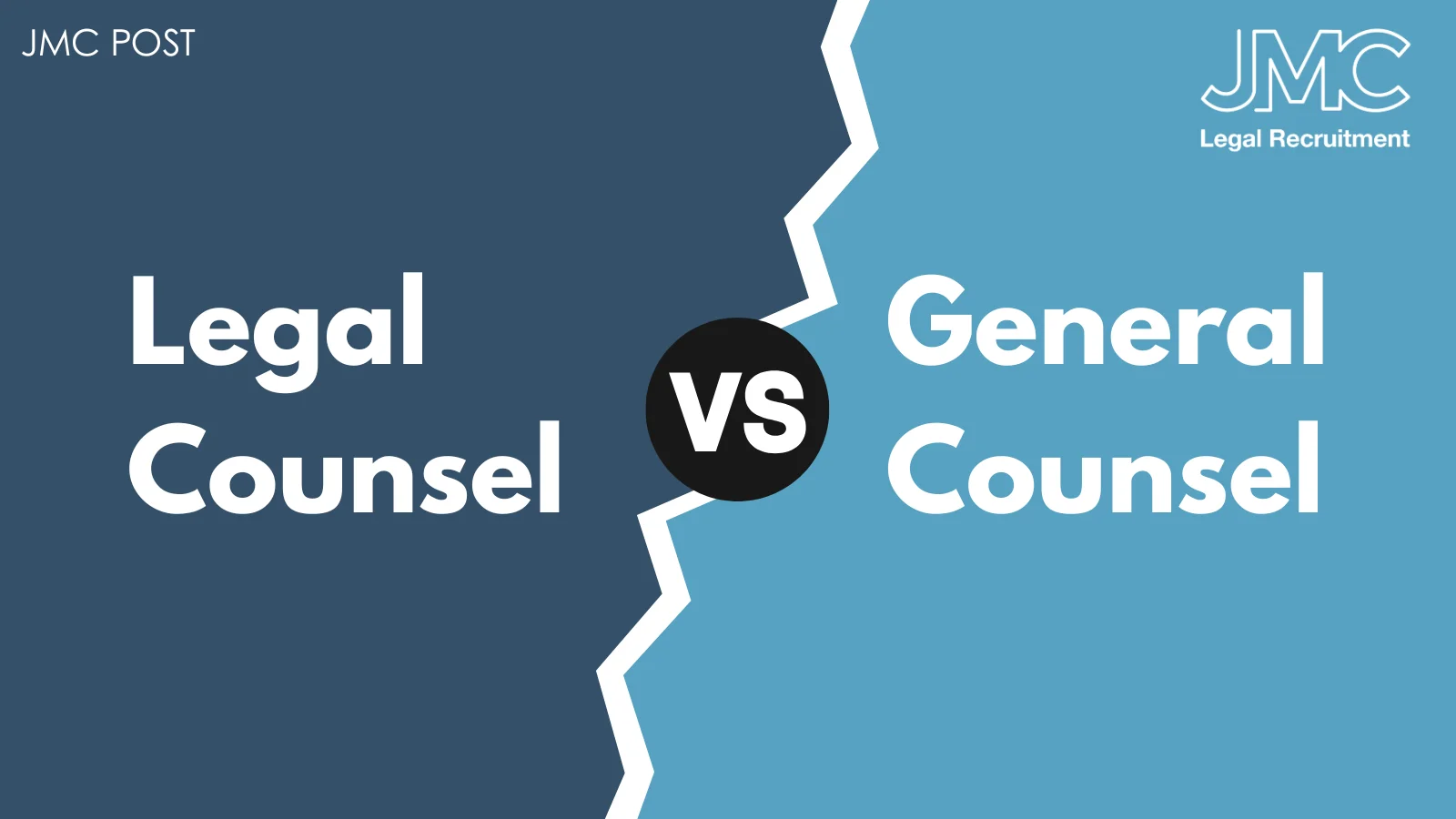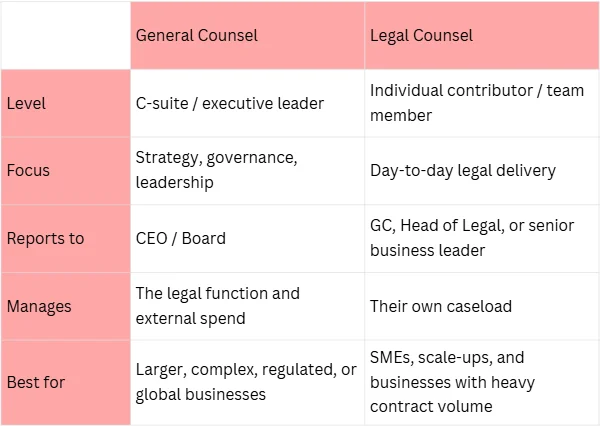
General Counsel vs. Legal Counsel
11 Sept, 20256 minutes
General Counsel vs. Legal Counsel
What’s the Difference – and Which Does Your Business Need?
When a business decides it’s time to bring legal expertise in-house, one of the first questions that comes up is: do we need to hire a General Counsel or a Legal Counsel?
The titles sound similar, but the responsibilities and impact of each role are very different. Choosing the wrong one can leave you with a skills gap at a critical stage of growth or with an expensive hire you didn’t actually need yet.
Let’s break down the differences between the two roles, explain how each fits into an organisation, and help you work out which hire is right for your business.
What does a General Counsel do?
The General Counsel (GC) is the most senior lawyer in an organisation. They are not just there to give legal advice, they are a strategic leader, sitting alongside the CEO and executive team, shaping the company’s approach to risk, compliance, and governance.
Key responsibilities of a GC include:
- Advising the board and executive team on legal risk, ethics, and governance.
- Leading the in-house legal function, including recruiting and managing other lawyers.
- Setting the overall legal strategy and making sure it aligns with business objectives.
- Managing relationships with external law firms and controlling legal spend.
- Preparing the organisation for crises whether that’s a regulatory investigation, litigation, or reputational risk.
In many organisations, the GC is now considered an essential voice at the leadership table. They help ensure that business decisions are not just commercially sound but also legally and ethically robust.
What does a Legal Counsel do?
Legal Counsel (sometimes called “In-House Counsel” or “Legal Adviser”) is usually a practising solicitor brought into the business to deliver day-to-day legal work.
The role is typically more execution-focused than the GC role. Legal Counsel are the lawyers “in the weeds” of the business, reviewing contracts, advising on transactions, and handling the day-to-day legal questions that come up.
Key responsibilities of a Legal Counsel include:
- Drafting, reviewing, and negotiating contracts with customers, suppliers, and partners.
- Advising on regulatory compliance in areas such as data protection, employment law, or sector-specific regulation.
- Supporting the business on disputes, working with external firms when litigation arises.
- Acting as a point of contact for commercial teams such as Sales, Finance, and HR.
- Creating playbooks, templates, and self-service tools to make the business more legally efficient.
Legal Counsel are the “hands-on” lawyers who keep the business moving and protect it from everyday risks.
What Are The Main Differences Between Legal Counsels and General Counsels?
Here’s a side-by-side comparison to make the differences clear:

Which should you hire first?
The right choice depends on your stage of growth, budget, and risk profile.
Hire a Legal Counsel first if:
- Contract volume is slowing down revenue because negotiations take too long.
- Your leadership team can already handle strategy and governance, but you need someone to execute.
- You want an embedded lawyer who can give quick, practical answers to day-to-day questions.
- Your legal budget can stretch to one hire, but not yet to a full legal function.
In many scale-ups, the first in-house hire is a Senior Legal Counsel, someone with around 5–8 years’ post-qualification experience. They’re senior enough to operate independently but not as expensive as a GC.
Hire a General Counsel if:
- You operate in a heavily regulated sector, or across multiple jurisdictions.
- The board expects a legal leader who can provide independent oversight.
- You are building (or plan to build) a legal team and need someone to structure it.
- The organisation faces reputational or regulatory risks where independence and executive authority are critical.
In many larger or listed businesses, a GC is non-negotiable. They bring the authority and independence needed to ensure governance, compliance, and risk management are taken seriously.
Whether you’re exploring your first in-house solicitor hire or looking to expand your legal function with senior leadership, JMC Legal Recruitment can connect you with the right talent. Speak to our Head of In-House Recruitment today about current in-house legal vacancies and tailored hiring strategies.
Related Articles:
[A Guide For Start-Ups Looking to Make Their First In-House Legal Counsel Hire]
[Challenges When Hiring an In-House Legal Counsel]
[The Truth About AI In House Lawyers Need To Know]



